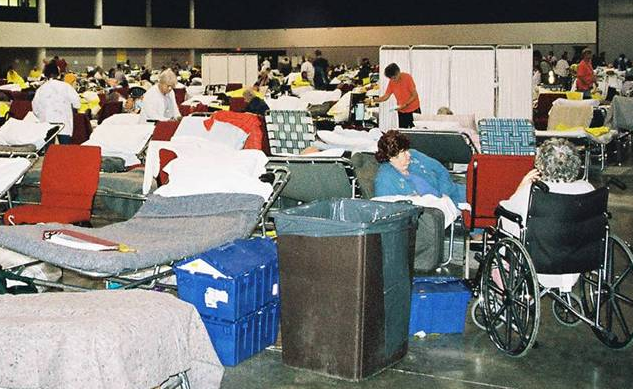When you are doing hurricane planning for special needs, the county’s special needs shelters should be a backup safety plan, NOT your main plan. Why?
- Special needs shelters are only designed for people who need minimal medical help. Assistance is limited to basic medical monitoring and back-up electricity for lighting. Pasco County sponsors special needs shelters within American Red Cross shelters and warn that though assistance is available for basic ADLs, if volunteers don’t report to the shelter no hands-on care will be available (only a nurse manager will be staffed there).
- Shelters are often crowded and noisy. You will likely have a cot (not guaranteed for everyone) in a large space with many others.
- Special needs shelters provide safety, but not necessarily comfort. They may be difficult to navigate if you have mobility issues and need assistance (lying on a cot or the floor may be difficult for you and pathways to bathrooms may be cluttered and lines may be long). Pinellas County has a host home program as one alternative (or see below for our team’s planning suggestions).
- Electricity may only be for backup lighting, thus air conditioning and hot water may not be available. With the crowds, the shelter can get quite uncomfortable.
- Pets are only allowed in specific pet-friendly shelters if registered (service animals are allowed).
Watch this Pinellas County video about What to Expect at a Special Needs Shelter.
How to register for special needs shelters:
Visit Pinellas County’s hurricane planning for special needs page. Complete the pre-registration form; you will be contacted for more information and assessed for eligibility. You don’t have to pre-register if you have transportation to a shelter, but it is highly recommended. Even though we don’t recommend the special needs shelters as your primary plan, we advise all elders and special needs clients to pre-register as a backup plan. You’re not obliged to go because you have registered.
Hillsborough County Special Needs Shelter information
Pasco County Special Needs Shelters
What to bring with you when going to a special needs shelter, host home or alternative stay:
- Two-week supply of medications (and other supplies like dressings, nasal cannulas, etc.)
- Required medical equipment and assistive devices (talk to your equipment company about power issues; emergency oxygen is available at Pinellas County special needs shelters)
- Snacks/food for special dietary requirements
- Clothing (comfortable, layers) and toiletries
- Comfort items: pillows, blankets (if going to a special needs shelter, remember you will be sleeping on a small cot or the floor)
- Things to keep you entertained (books, crossword puzzles, music/headphones, pack of cards, etc.)
- Cooler for foods or medications that require refrigeration
- List of key contacts and medical information (doctors, diagnoses, medications, allergies)
- Special considerations for specific impairments (our team can help you put these together) such as pen and paper or a whiteboard for someone with hearing impairment for communication; magnifier for someone with visual impairment; repair supplies for wheelchairs or other devices; extra hearing aid batteries
- Cell phone with chargers (extra power banks are quite useful too), programmed with key numbers (and notes of information, access to health records online if you have a smart phone).
- See more/print our hurricane supplies checklist. Make sure to label your items with your name and contact information (especially expensive medical equipment).
In our next post, we will share with you exactly how our team can help you look at special needs hurricane planning options to find the best alternatives and be prepared. We will share alternative options and how to assess properly for realistic plans. Call us at 727-447-5845 or click below for help with hurricane planning and other eldercare needs:








